|
|
|
Sort Order |
|
|
|
Items / Page
|
|
|
|
|
|
|
| Srl | Item |
| 1 |
ID:
086849
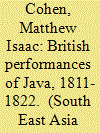

|
|
|
|
|
| Publication |
2009.
|
| Summary/Abstract |
This article looks at the reception of the British interregnum of Java (1811-1816) in the theatre through a comparison of Jane Scott's pantomime The Poison Tree (1811), George Colman the Younger's melodrama The Law of Java (1822) and the case of 'Princess Caraboo', a Devonshire serving girl who posed as a princess from 'Javasu' in Bristol in 1817 and later performed the story of her career as an impostor on stage in America. The author examines these productions in their historical contexts, as well as later stagings, including the film Princess Caraboo (1994) starring Phoebe Cates, and the 2006 Royal Holloway production of The Law of Java. He suggests that not only did stage interpretations of Java offer a ground for imperial fantasy and virtual travel, but they also presented opportunities for the articulation of a range of contemporary issues related to class, gender, human rights and modes of governance.
|
|
|
|
|
|
|
|
|
|
|
|
|
|
|
|
| 2 |
ID:
145976


|
|
|
|
|
| Summary/Abstract |
Failure and denial are seductive concepts, and they were explicitly theorised at the Millennium conference in October, 2015. Though used to evoke an array of images to understand the condition of International Relations (IR) as a discipline and in relation to other social sciences, the concepts were not previously deemed pivotal for theorising world events. This article critically assesses how failure and denial are used by IR’s scholarly community as signifiers, and what it is that they signify. To this end, it considers Bruno Latour’s keynote address at the 2015 Millennium conference, along with some of Latour’s shorter works. Drawing on STS (science and technology studies), postcolonial and queer sensibilities, it concludes with a discussion of the significance of theatre in IR scholarship, and examines the broader social and political implications of how we think and understand failure and denial in the era of the Anthropocene.
|
|
|
|
|
|
|
|
|
|
|
|
|
|
|
|
| 3 |
ID:
127849
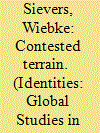

|
|
|
|
|
| Publication |
2014.
|
| Summary/Abstract |
Culture in Vienna has become more diverse with successive waves of immigration since the 1960s, but Austrian cultural policies have been slow in picking up this trend. While the federal state has been focusing on maintaining traditional cultural institutions in Vienna such as the Staatsoper, the Burgtheater and the Kunsthistorisches Museum, the city of Vienna has pushed integration and later diversity in cultural policies since the 1990s, albeit more in discourse than in actual funding. Artists of immigrant origin harshly criticise this dire situation: they claim the place which they have not yet been granted, not only in cultural policies, but also in society.
|
|
|
|
|
|
|
|
|
|
|
|
|
|
|
|
| 4 |
ID:
142833
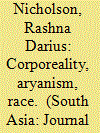

|
|
|
|
|
| Summary/Abstract |
Recent scholarship has problematised the ‘impact-response’ theory that ideas such as Aryanism, eugenics and militarism were merely imported from a European context into a South Asian one. This paper delineates a longer trajectory of the relationship between corporeal language and communal identity through a focus on the Parsi community of western India. As early as 1853, reformist Parsis enacted modes of ancient Kayānī virility in the gymnasium and theatre to redefine notions of communal identity that drew simultaneously from Enlightenment precepts and a mythic Aryan heritage discovered by Orientalists. Subsequently, the confluence of a loss of numerical, financial and political strength, and the popularisation of the ideas of Darwin and Mendel, prompted a shift in ethnic and semantic thinking, whereby the language of corporeality was co-opted by the orthodox faction to justify the bifurcation of religion and race. Consequently, Parsis, in the midst of a rising Hindu nationalist movement, called not only for the revival of Persian epic theatre, a Parsi militia, the exclusion of ‘half-castes’ from the community and the castration of ‘mentally defective’ community members, but also for a renewal of ties to Iran and a separate state of Parsistan.
|
|
|
|
|
|
|
|
|
|
|
|
|
|
|
|
| 5 |
ID:
180621
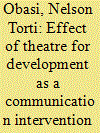

|
|
|
|
|
| Summary/Abstract |
Despite the ongoing conflict between farmers and herdsmen in Nigeria, researchers are yet to substantially focus attention on ways of empowering victims of the conflict through skills acquisition. This study attempts to fill this gap by assessing the effectiveness of theatre for development as a communication intervention strategy for positively influencing the perceptions, knowledge and behavioural intentions related to painting, weaving and fashion and design of victims of the conflict between farmers and herdsmen in Nigeria. A quasi-experiment was utilised with 470 participants. Theatre for development was found to be an effective communication intervention strategy for positively influencing the participants regarding the three arts and crafts examined. The implications of these results for human capital theory and the theory of planned behaviour are explored, and recommendations are made.
|
|
|
|
|
|
|
|
|
|
|
|
|
|
|
|
| 6 |
ID:
153638
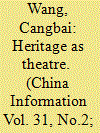

|
|
|
|
|
| Summary/Abstract |
Since China’s signing of UNESCO’s World Heritage Convention in 1985, cultural heritage in China has become a booming industry and a key area of scholarly investigation. The mainstream literature on China’s heritage and urbanization tends to view heritage as a civilizing agent to regulate and improve the urban population. Drawing on Clifford Geertz’s notion of ‘theatre state’ and through a case study of Jiangmen, this article reconceptualizes China’s urban heritage industry as ‘theatre’. It shifts the focus away from neat political rationalities to messy ‘magical assemblages’, such as dramatic museum representation, monumental architecture and expressive ceremonies, in state-led heritage-making processes. It argues that the Chinese government makes heritage by using not only the means of political rationalities but also, and perhaps more importantly, the power of spectacle, sensation and awe. China’s heritage industry is thus as much ‘a technique of enchantment’ as ‘a technique of government’, revealing complicated processes of China’s negotiation with the Western-centred conceptualization of modernity and cultural heritage. Additionally, it draws attention to diasporic resources in urban heritage-making, broadening the existing research that has predominantly focused on the employment of nostalgic and/or exotic appeal for city branding and development.
|
|
|
|
|
|
|
|
|
|
|
|
|
|
|
|
| 7 |
ID:
062623
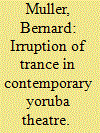

|
|
|
|
|
| Publication |
Apr-Jun 2005.
|
|
|
|
|
|
|
|
|
|
|
|
|
|
|
|
| 8 |
ID:
111516
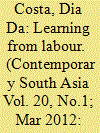

|
|
|
|
|
| Publication |
2012.
|
| Summary/Abstract |
Recent attempts to rethink labour history and contemporary labour struggles in India have variously memorialised the 'lost worlds' of industrial labour struggle and argued for stretching the terms of labour historiography, in part, by moving beyond the conceptual and political boundaries of the factory gate to take into account the complex configurations of labour, accumulation and struggle. This article contributes to this scholarship with a methodological focus on political theatre by three organisations in India. I ask what we might learn about labour and labour struggles when we look through the lens of cultural activism by the urban and rural poor. Drawing on Kalyan Sanyal's provocative distinction between accumulation and need economy, I argue that contemporary cultural work and activism both refuses and contributes to the market-based fetishisation of surplus-value as the sole purpose of work and as such it founds a view of labour and labour struggle that learns from labour and not just capital.
|
|
|
|
|
|
|
|
|
|
|
|
|
|
|
|
| 9 |
ID:
133832
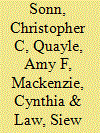

|
|
|
|
|
| Publication |
2014.
|
| Summary/Abstract |
From 2010 to 2012 a diverse group of young people participated in an oral history theatre project, Chronicles, which aimed to support them to claim a personally meaningful Australian identity. Oral history theatre was used to facilitate a process whereby the young people were able to reconnect with their personal family histories, encounter Aboriginal young people and stories, and together interview Aboriginal Elders. Through this process, they could develop new understandings of their own social identities, and meanings of and possibilities for belonging. 'Centring diverse lives, decentring whiteness' and 'a different starting point: Aboriginal ways of knowing', were the two key outcomes that we report on. Bringing people from diverse cultural and social backgrounds together to share stories of history, culture and identity, offers a unique vantage point from which to rupture dominant narratives about belonging/non-belonging and show up whiteness, and together forge a new Australian identity reflective of everyday multiculturalism.
|
|
|
|
|
|
|
|
|
|
|
|
|
|
|
|
| 10 |
ID:
093963
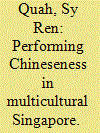

|
|
|
|
|
| Publication |
2009.
|
| Summary/Abstract |
Chinese Singaporeans in different eras perceive their identity as a Chinese very differently, both with regards to historical specificities and in the context of a multicultural Singapore. Through the discussion of various literary and cultural texts, this article aims to rethink how the concept and perception of Chineseness change over half a century, in relations to Singapore's multicultural society, and especially to the presence of China, ideologically, psychologically and economically.
|
|
|
|
|
|
|
|
|
|
|
|
|
|
|
|
| 11 |
ID:
171093
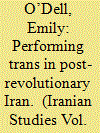

|
|
|
|
|
| Summary/Abstract |
In the wake of a string of sensationalist documentaries about transsexuality in Iran, Iranian theatre and film artists began crafting groundbreaking trans performances to educate audiences and depict characters living non-heteronormative lives without the translating influence of queer theory or identity politics. Investigating transsexual bodies as assembled by jurists in Iranian Shiʿa jurisprudence and by artists on stage and screen reveals the ways in which the transsexual body is constructed in Islamic legal discourse and represented in narrative and bodily form in the public imaginary in Iran. Representations of transsexuality in theatre and film highlight the role of the arts as a vehicle for social change, communal recognition, and self-cognition. In particular, performances of female-to-male gender transitions in theatre and film have expanded the boundaries of how gender presentation is translated onto Iranian stages, into Tehran coffeehouses, and onto global screens. These trans performances usher Iranian spectators into new forms of viewership and artistic consumption in their attempt to creatively represent transsexual bodies and narratives to increase tolerance towards transsexuals; further, they have ignited a conversation among artists and activists about the assemblage of transsexual bodies in artistic productions and the most effective narrative and emotional forms of catharsis to inspire change.
|
|
|
|
|
|
|
|
|
|
|
|
|
|
|
|
| 12 |
ID:
178548
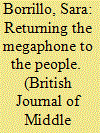

|
|
|
|
|
| Summary/Abstract |
‘We return the megaphone to the people’. This is how the activist Hosni al-Mukhlis describes the aim of the Theater of the Oppressed group that he founded in Casablanca in 2012. He was one of the main leaders of the 20 February Movement in 2011 and today he is involved in what he defines as 'a new social and political pedagogy through art’. Based on interviews and participant observation with Moroccan activists, this article focuses on the Theater of the Oppressed group as an example of the wave of socio-political activism involving artistic practices that emerged after the Arab uprisings in some MENA countries. The paper situates this artivism within the context of political disenchantment and social exclusion experienced in the wake of the failure of the 20 February Movement vis à vis the Moroccan authoritarian politics. The article argues that the Theater of the Oppressed can be interpreted as artivism that generates political transformations, opens critical spaces in the public sphere and promotes emancipatory trajectories for those involved in its mobilizing projects, in functioning as political praxis pursuing a renewed proximity between activists and ordinary people, as well as the creation of a new collective imagination and a critical citizenry.
|
|
|
|
|
|
|
|
|
|
|
|
|
|
|
|
| 13 |
ID:
091725
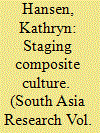

|
|
|
|
|
| Publication |
2009.
|
| Summary/Abstract |
Both the rural-based Nautanki and its urban counterpart, the Parsi theatre, remain part of the cultural scenario of modern India and continue to contribute to the ongoing negotiation of India's composite culture. Part of the appreciation of these older stylized theatre genres comes from awareness of their hybrid character. As emblems of composite culture, these theatrical traditions remind viewers of a popular secular outlook that is still within reach. This article discusses two performances observed during 2004 in New Delhi, of Amar Singh Rathor and Yahudi ki Larki, both canonical popular texts. It is argued that the revival of these plays owes much to their ability to serve as allegories within the current polarized cultural and political climate. The discussion suggests the continuing potential of the impulse to counter neo-nationalist ideology by means of popular media such as Nautanki and Parsi theatre.
|
|
|
|
|
|
|
|
|
|
|
|
|
|
|
|
| 14 |
ID:
088791
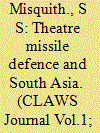

|
|
|
|
|
|
|
|